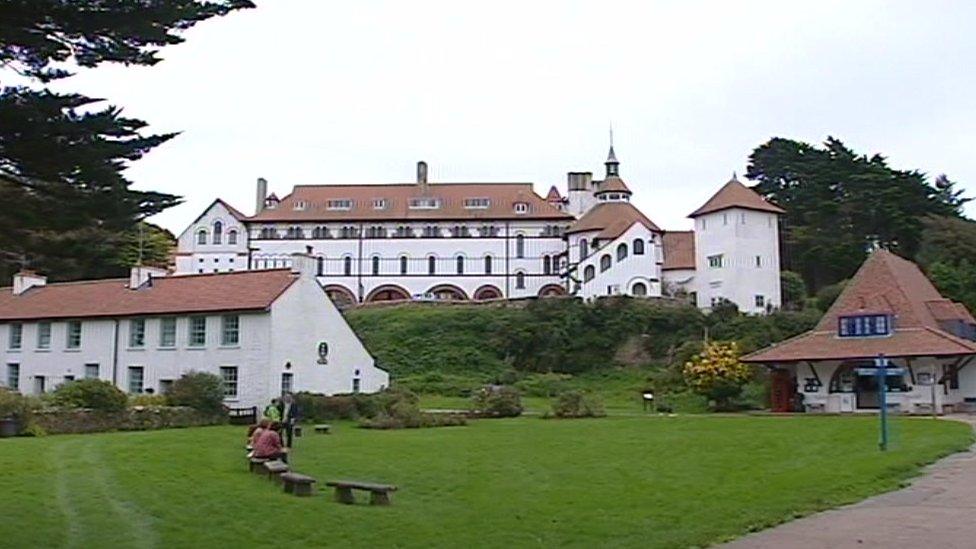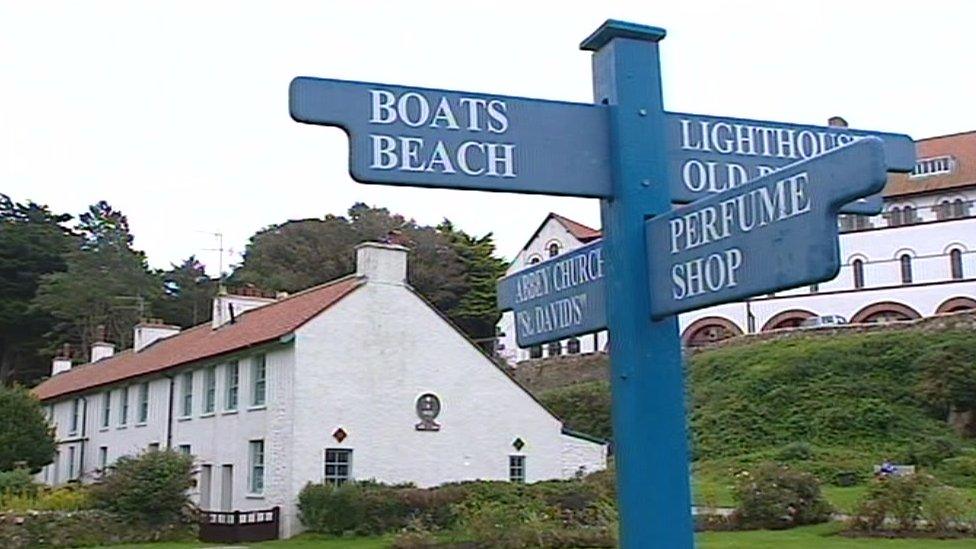Dyfed-Powys Police confirm Caldey Island sex abuse reports
- Published

Dyfed-Powys Police has told BBC Wales it received reports of historical sexual abuse perpetrated by a monk on Caldey Island in the 1970s and 1980s.
The force investigated in 2014 and 2016 but could not prosecute as the monk, Father Thaddeus Kotik, died in 1992.
The Guardian newspaper has reported that Caldey Abbey has paid compensation to six women, external who were abused as children.
BBC Wales has attempted to contact Caldey Abbey in Pembrokeshire.
Court papers seen by The Guardian said Kotik carried out the abuse between 1972 and 1987 and the women, who were on holiday at the time, believe there may be many more victims.
Kotik worked in the abbey's dairy and befriended families who regularly visited the island.
After gaining the trust of parents he would babysit the children and sexually abuse them, the papers suggest.
The women, who are not identified, said the abbey knew about the offences and failed to report Kotik to the police.
'Terrified'
In civil proceedings against the abbey, they said it was liable for the alleged assaults which occurred on its property by Kotik who was charged with the safekeeping and care of the children.
The women said that Kotik "terrified them into silence" and said if they told anyone their parents would not want them and leave them on the island with him.
In 2014, one of the women e-mailed the current abbot of Caldey Abbey, Brother Daniel van Santvoort, and told him that the effect of the abuse had been catastrophic.
She said: "Father Thaddeus' perversion has left me with ongoing feelings and experience of severe anxiety, fear, guilt and sadness.
"I have lived my life feeling a deep and misunderstood level of self-hatred and an inability to trust and believe in another person truly loving me."
The Guardian reports Brother Daniel had heard allegations previously about Kotik and in response he wrote: "I have heard occasionally about this serious matter as regards Father Thaddeus."
He told her that the monastery knew about his offences and that he had been banned from contact with islanders and visitors in the 1980s but it had not been reported to the police.

"I am fully aware now of this terrible criminal offence and Father Thaddeus should have... been handed over to the police - something that never happened," he added.
Brother Daniel forwarded the e-mails to Dyfed-Powys Police who asked for a formal statement which she submitted.
In response, a Dyfed-Powys Police spokesman said: "We can confirm that in 2014 and 2016 we received reports of non-recent sexual abuse that occurred at Caldey Island with the named offender being the deceased Thaddeus Kotik.
"These reports were recorded as crimes and victims contacted by police.
"During the investigation, information was obtained to confirm that the perpetrator was deceased and therefore a prosecution was not possible.
Appropriate professional support was offered and the matter was drawn to a close.
"Dyfed-Powys Police always encourages anyone who has suffered abuse to come forward and report it by calling 101."
Brother Daniel apologised to the woman but, according to the Guardian, during the legal proceedings the abbey claimed it had no knowledge of the abuse.
'Apology request'
The Guardian reported it also argued there was an "evidential disadvantage" in that none of the monks at the abbey during the time of the allegations were still alive and claimed it was not liable as the priest was not employed by the abbey to provide care for children.
The defence therefore required the claimants to prove each offence.
According to the Guardian, it also argued that the victims were out of time to sue for damages and it was not possible for the abbey to have a fair trial.
It is also reported that the abbey asked the court not to allow the claim because the seriousness of the allegations was likely to attract attention that may threaten the continued existence of the abbey.
The women accepted what the Guardian describes as "meagre" compensation payments and received no apology.
The solicitor representing the women, Tracey Emmott, told The Guardian: "It took the issuing of court proceedings before the out of court settlements were offered and even then my client's request for a formal apology as part of the settlement package was never forthcoming."
